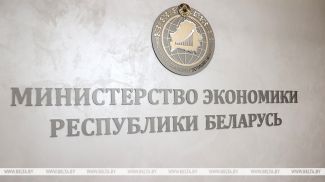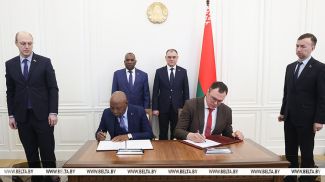MINSK, 9 March (BelTA) - It is too early to assess the full impact of the sharp decline in oil prices and the devaluation of the Russian ruble, Belarus Prime Minister Sergei Rumas told BelTA while commenting on the situation in the markets and how it may affect Belarus.
“I think it is not yet possible to assess the full impact of the devaluation of the Russian ruble and the sharp decline in oil prices. We will see how the situation will be developing. The Russians issued a statement that the Finance Ministry will be selling foreign currency. It is an extraordinary decision. The first few days of this week will show how the situation with the Russian ruble will be developing. Our National Bank will build its strategy accordingly,” the prime minister said.
“In any case, the National Bank will be following the market trends and will not artificially restrain the Belarusian ruble,” Sergei Rumas said.
Asked whether any reserves would be used, the head of government said: "If the National Bank is guided by the market trends in supply and demand, this will not lead to excessive spending of the gold and foreign exchange reserves. That is its strategy.”
Sergei Rumas also answered the question what pros or cons the fall in oil prices carry for Belarus. “It is now an additional opportunity to reach an agreement with the Russian Federation. The current situation is very different from the situation in December or January," he said.
The prime minister confirmed that this has an equal impact on the negotiations with other oil suppliers.
BelTA quoted TASS as saying that the cost of futures for Brent crude oil with settlement in May 2020 on the ICE Exchange in London fell by 42.6% to $31.74 per barrel. The cost of the April futures contract for WTI crude oil fell by 48.9% to $ 27.72 per barrel. According to Bloomberg, Brent futures suffered the second-largest decline on record in the opening seconds of trading in Asia, behind only the plunge during the Gulf War in 1991.
Oil price is falling amid news that OPEC+ countries failed to agree on an additional reduction in oil production amid falling demand due to coronavirus. OPEC proposed to further reduce production by 1.5 million barrels per day until the end of this year. However, Russia and Kazakhstan opposed this proposal. Russia, in particular, insisted on the extension of the current agreements only for the second quarter.
The world stock markets have already responded to a sharp drop in the cost of oil. Thus, the futures on the S&P 500 that include 500 biggest companies on the U.S. market are down 145.10 points (4.90%). Dow Jones futures plunged 1,245 points (4.85%). Nasdaq futures tumbled 410 points (4.82%).
The sharp decline in world oil prices caused a mass sale of shares in Asian stock markets. At the start of trading Hong Kong index Hang Seng lost more than 1,000 points, or almost 3.9%. Trading on the stock markets of China, Japan, Singapore, the Republic of Korea and Thailand is also in the negative. In Hong Kong, shares of Chinese giant Petrochina have fallen by almost 10%. The securities of China National Offshore Oil Corporation (CNOOC) depreciated by 17%.
The situation on the oil market is affecting the exchange rate of the Russian ruble. The rate of the the Russian ruble to U.S. dollar at the international market Forex reached RUB73.47 on Monday. The rate of the the Russian ruble to the euro went up to RUB83.77.













